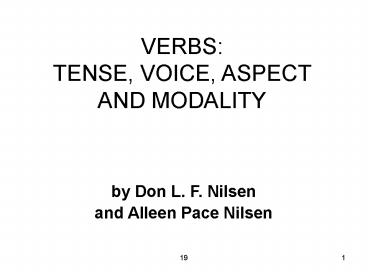VERBS: TENSE, VOICE, ASPECT AND MODALITY - PowerPoint PPT Presentation
Title:
VERBS: TENSE, VOICE, ASPECT AND MODALITY
Description:
Title: PowerPoint Presentation Last modified by: Don Nilsen Created Date: 1/1/1601 12:00:00 AM Document presentation format: On-screen Show Other titles – PowerPoint PPT presentation
Number of Views:252
Avg rating:3.0/5.0
Title: VERBS: TENSE, VOICE, ASPECT AND MODALITY
1
VERBS TENSE, VOICE, ASPECTAND MODALITY
- by Don L. F. Nilsen
- and Alleen Pace Nilsen
2
Active vs. Passive Headlines
- American Bomb Kills 10 Iraqi Civilians
- Ten Iraqi Civilians Killed by American Bomb
- Ten Iraqi Civilians Killed
- Ten Iraqi Citizens Are Casualties
- (Smith Wilhelm 19)
3
Active vs. Passive Headlines
- IN A NEW YORK PAPER
- Sox Win Another One!
- Sox Trounce Yanks in Extra Innings
- IN A BOSTON PAPER
- Yankees Beaten Again
- Bronx Bombers Let Another One Slip Away
- In discussing these headlines, explain the curse
of the Babe. - (Smith Wilhelm 20)
4
Subject-Verb Agreement
- Smith Wilhelm suggest that if students want
their subjects and verbs to agree, they should - cross out all of the words that separate
subjects from their predicates and then check
that their verb choice was correct. - Remember that each, either, every, everyone,
everybody, someone, and somebody are
grammatically singular. - (Smith Wilhelm 124-126)
5
Verbs are the boss
- In The chair laughed, the verb takes control.
- This sentence personifies chair.
- It does not depersonify laughed.
- Verbs (like the sun in the solar system) control
the nouns and prepositional phrases that surround
them (their case frames).
6
Transitivity
- dance
- Mary dances beautifully.
- slap
- Mary slapped John.
- be
- Obama is President/smart/here.
- give
- Mary gave John a new car.
- elect
- The country elected Obama President.
7
Irregular Verbs
Auxiliary Verbs Be (suppletive) Have Do Bring Buy Dive Drive Go (suppletive) Cf. wend Hang (2) Hit Lie/Lay Rise/Raise Sit/Set Sell Swim (Smith Wilhelm 250-269)
8
Irregular-Verb Paradox
- Rare verbs tend to become regular.
- Therefore, in all languages, the most common
verbs tend to be the most irregular.
9
Converses
Break John broke the window with a hammer A hammer broke the window The window broke. Buy Sell Rent to Rent From Sense Verbs Feel Smell Hear/Sound Look at/Look Taste
10
TENSE Past -ed Present -s Future will or
shall ASPECT Perfect (have -en) Progressive
(be -ing) VOICE Passive (be
-en) MODALITY can could will would shall shou
ld may might must
11
TENSE Past -ed Present -s Future will or shall ASPECT Perfect (have -en) Progressive (be -ing) VOICE Passive (be -en) MODALITY can could will would shall should may might must NOTE Past Participles usually end in ed or en Present Participles always end in ing Gerunds always end in -ing
12
TIME TRUTH ASPECT
VOICE
/ \
TENSE (MODAL) (PERFECT) (
PROGRESSIVE) (PASSIVE) VERB past can
could (have -en) (be -ing) (be -en)
drive present will would future
shall should may might must
13
can be able to will be going to shall
be going to should be supposed to may
be expected to might be expected
to must be obligated to
14
EXPLAIN THE FOLLOWING IN TERMS OF SOUNDS AND
MEANINGS John supposed that the meeting had
begun. John was supposed to do something. I have
two wives. I have to leave school early. Alleen
has two husbands. Mary has to prepare dinner for
her husbands. Mary used all of the
medicine. Mary used to be ill.
15
The cake was eaten (passive) The cake got eaten
(get passive) John doesnt have a book.
(American John hasnt a book. (British) Does
John have a book? (American) Has John a book?
(British) John is eating the cake.
(progressive) The cake is eaten. (passive) John
is an idiot. (main verb set membership) John
has eaten the cake. (perfect) John has a new car.
(main verb possessive) John doesnt know what
to do. (do-support) John does the dishes once a
week. (main verb)
16
TIME OF SPEAKING TIME OF EATING before ) TIME
OF ARRIVING ! 1). I had eaten before you
arrived (past perfect).
_____)!_____________________ 2). I have eaten.
(present perfect)
_______________)____________ 3). I will have
eaten when you arrive (future perfect).
______________________)!_____
17
4). I was eating when you arrived. (past
progressive) ------!--------------------
------- 5). I am eating. (present progressive)
-----------------
--------- 6). I will be eating when you
arrive (future progressive) ---------------------
---------!
18
7). A prisoner ate the cake ? The cake was eaten
by a prisoner. (past passive) 8). Rust
corrodes iron. ? Iron is corroded by rust
(present passive) 9). A prisoner will eat the
cake. ? The cake will be eaten by a prisoner.
(future passive)
19
!EXPLAIN THE TENSE, VOICE AND ASPECT OF THE
FOLLOWING SENTENCES! 1). Ryan is driving a
taxi. 2). Sally has baked a cake. 3). Jeri had
finished her homework before you left for
work. 4). Mark will have finished the repairs
tomorrow morning. 5). Brenda had been eating
cherries all morning.
20
!! 6). The new kid was being beaten by some gang
members. 7). The presidency will be won by the
hardest campaigner. 8). The article is being
written by a real sports enthusiast. 9). Mikey
has been eating this kind of cereal for years.
21
!!!AND NOW FOR THE MOST DIFFICULT SENTENCE IN THE
ENGLISH LANGUAGE 10). The taxi might have
been being driven by a nut.
22
- References
- Fromkin, Victoria, Robert Rodman, and Nina Hyams.
An Introduction to Language, Seventh Edition.
Boston, MA Thomson/Heinle, 2003. - Smith, Michael W., and Jeffrey D. Wilhelm.
Getting It Right Fresh Approaches to Teaching
Grammar, Usage and Correctness. New York, NY
Scholastic, 2007































